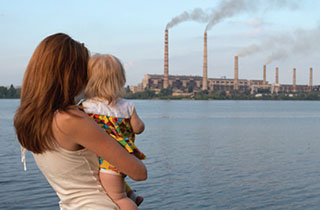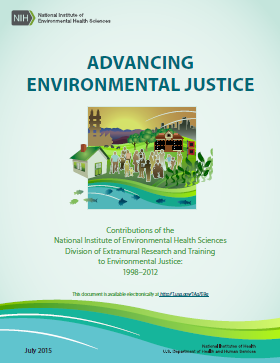
Environmental factors such as air and water quality are fundamental determinants of our health and well-being. Environmental factors can lead to disease and health disparities when the places where people live, work, learn, and play are burdened by social inequities.
These social inequities, often referred to as social determinants of health, include differences in individual behaviors, cultural influences, access to health services, economic status, and literacy levels. Environmental health disparities exist when communities exposed to a combination of poor environmental quality and social inequities have more sickness and disease than wealthier, less polluted communities. NIEHS has long worked to reduce environmental health disparities and promote environmental justice — the fair treatment and meaningful involvement of all people in environmental laws and policies regardless of race, nationality, or income.
NIEHS is committed to reducing environmental health disparities as shown in our new Strategic Plan. To support these goals, over the past two decades, the NIEHS has supported numerous research programs, community-engaged activities, and training and education programs to address the disparate health impacts of environmental hazards on disadvantaged communities and ensure environmental health equity.
What NIEHS Is Doing
Center Programs
NIEHS supports research and activities that aim to reduce environmental health disparities and promote environmental justice through a variety of programs, which are made up of highly interdisciplinary teams of researchers and medical professionals.
Centers of Excellence on Environmental Health Disparities Research
The Centers of Excellence on Environmental Health Disparities Research (EHD Centers) program is a collaborative effort supported by NIEHS, the National Institute on Minority Health and Health Disparities, and the U.S. Environmental Protection Agency.
The EHD Centers encourage basic, epidemiological, and social scientific investigations of disease conditions that significantly burden low socioeconomic populations and those with health disparities. The Centers support research efforts, mentoring, capacity building, research translation, and information dissemination, and are designed to address program-specific research priorities.
Learn more about the EHD Centers and their primary areas of research.
Children’s Environmental Health Translation Centers
Applying an innovative concept, these new Centers will support scientists, health care professionals, and local communities by developing and testing strategies for communicating information about children’s environmental health. These strategies may include short courses for medical staff, social media tools, ways to report personalized data on environmental exposures, and risk communication methods.
Superfund Research Program
The NIEHS Superfund Research Program (SRP) funds multidisciplinary research on human health and environmental issues related to hazardous substances. Teams of diverse professionals develop, test, and implement unique, solution-oriented approaches to address complex environmental health problems.
SRP grantees proactively communicate their scientific accomplishments to the public through community outreach and engagement cores, to industry via technology transfer, or to government through partnerships.
Learn more about SRP grantees and their community engagement cores.
Environmental Health Science Core Centers
The NIEHS Environmental Health Science (EHS) Core Centers Program facilitates scientific collaboration and utilizes cutting-edge technologies to advance understanding about how pollutants and other environmental factors may affect health and disease.
EHS Core Centers across the country, each with their own strategic vision and scientific focus, share common goals in advancing scientific research, promoting community engagement, advancing translational research, and training new researchers.
Learn more about the EHS Core Centers Program and their community engagement cores.
Breast Cancer and the Environment Research Program
The Breast Cancer and the Environment Research Program (BCERP), jointly funded by NIEHS and the National Cancer Institute, supports the advancement of research on genetic and environmental factors that could affect a woman’s chance of developing breast cancer. Grantees use targeted communication strategies to educate women, health care professionals, advocates, and the public on ways to reduce breast cancer risk.
Community Engaged Research
NIEHS fosters community involvement in research through both solicited and unsolicited projects.
Research to Action
The Research to Action (R2A) program brings together community members and researchers to investigate the potential health risks of environmental exposures that are of concern to the community. A key component of the program is the meaningful involvement of communities in both data collection and research translation.
Learn more about the R2A program.
Climate Change and Human Health
The most vulnerable people — children, the elderly, the poor, and those with underlying health conditions—are at increased risk for health effects from a changing climate. The NIEHS Climate Change and Human Health Research program funds research aimed at understanding the health impacts of climate change and how strategies used to adapt to or lessen climate change might affect health adversely.
Partnerships for Environmental Public Health
Partnerships for Environmental Public Health (PEPH) is a network of scientists, community members, educators, healthcare providers, public health officials, and policymakers who share the goal of increasing the impact of environmental public health research at the local, regional, and national level. PEPH defines environmental public health as the science of conducting and translating research into action to address environmental exposures and health risks of concern to the public.
Learn more about PEPH.
Training and Education
NIEHS supports training and education through several programs. Training and education programs are important to build capacity to conduct research or enhance environmental health literacy within communities, among underrepresented groups, and among people who may come in to contact with environmental health hazards through their occupations.
Worker Training Program
The NIEHS Worker Training Program (WTP) funds nonprofit organizations to provide health and safety training to workers across the country. Workers come from a broad range of industries and occupations involved in handling or responding to emergency releases of hazardous materials.
Each nonprofit organization funded by WTP focuses on training activities in specific program areas, including Superfund related activities, clean-up of nuclear weapons facilities, and biosafety and infectious disease activities.
Environmental Health Science Education
NIEHS focuses on environmental health science (EHS) education in a variety of areas. These include K-12 EHS education, education through the community engagement cores and training cores, summer research experiences for high school and undergraduate students, and technology transfer programs.
Learn more about NIEHS EHS Education.
Other NIEHS Contributions to Advancing Environmental Justice

The Advancing Environmental Justice (3MB) report highlights the contributions to environmental justice by the NIEHS Division of Extramural Research and Training (DERT). It provides a brief history of the environmental justice movement, the role of and funding investments made by DERT, an analysis of those contributions, conclusions, and suggested next steps.
In addition, the Advancing Environmental Justice: Annotated Bibliography (695KB), a compendium to the report, lists and summarizes peer-reviewed research articles from projects highlighted in the report.
Program Team
Program Contact for Worker Training Education
-

-
Sharon D. Beard, M.S.
Branch Chief;
Worker Education and Training Branch -
Tel 984-287-3237
Fax 301-451-5595
[email protected] -
P.O. Box 12233Mail Drop K3-14Durham, NC 27709
Program Contact for Environmental Epidemiology
-

-
Kimberly Gray, Ph.D.
Health Scientist Administrator -
Tel 984-287-3262
[email protected] -
530 Davis Dr530 Davis Drive (Keystone Bldg)Durham, NC 27713
-

-
Lindsey A. Martin, Ph.D.
Health Scientist Administrator -
Tel 984-287-4036
[email protected] -
P.O. Box 12233Mail Drop K3-05Durham, NC 27709
Program Contact for Environmental Justice and Partnerships for Environmental Public Health (PEPH)
-

-
Liam O'Fallon, M.A.
Health Specialist -
Tel 984-287-3298
Fax 919-316-4606
[email protected] -
P.O. Box 12233Mail Drop K3-12Durham, NC 27709
-

-
Claudia Thompson, Ph.D.
Chief, Population Health Branch -
Tel 984-287-3330
Fax 919-541-4937
[email protected] -
P.O. Box 12233Mail Drop K3-04Durham, NC 27709


